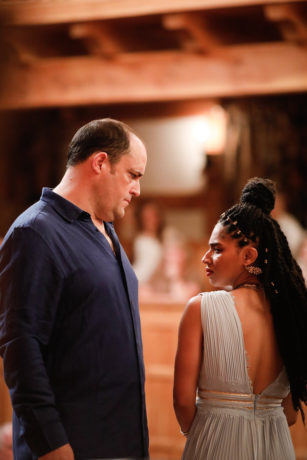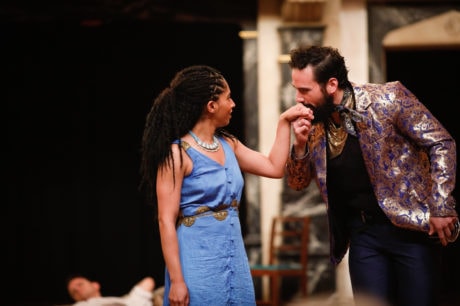The plays of George Bernard Shaw are, to be honest, an acquired taste. Erudite in the extreme, filled with Shaw’s unique sense of his own intellectual superiority—which is expressed with paper-thin discretion through his characters—they can be so demanding that at least one actor’s studio sets apart a whole semester for Shaw’s work alone.

Shaw’s hyper-intellectual plays are shelved cheek-by-jowl next to those of his nemesis, the ever-popular William Shakespeare, which has to be one of literary history’s most delicious jokes. Shaw often trumpeted his own (imagined) superiority as a playwright, and in the case of Caesar and Cleopatra— now playing in repertory with Shakespeare’s own Julius Caesar and Antony and Cleopatra at the American Shakespeare Center in Staunton, Virginia—believed he could do history with more wit and insight than the Bard ever could.
That such puffery and self-promotion deserves a good old-fashioned, vaudevillian smack-down should be obvious. And who better to put Shaw in his place than the American Shakespeare Center, with its Blackfriars Playground—er, Playhouse—as the site of one of the most hilarious spoofs of ‘Shavian wit’ ever conceived? By setting Shaw’s and Shakespeare’s work alongside each other, you have a chance to see these two titans of the stage go at it, and decide for yourselves which one gives more bang for the buck, and more occasions for reflection.
Director Eric Tucker, of New York’s Bedlam Theatre, a company whose four-actor production of Shaw’s Saint Joan put their unique approach on the map, has transformed the stuffy and self-important Shaw into a madcap wit, mining Caesar and Cleopatra for its myriad opportunities for mischief, sight-gags, even strip-tease (OK, they’re modest, but hey – anything for a laugh). By exploring the absurdity of Ancient Egypt, which was already absurd when Shaw found it, Tucker and the ASC’s ensemble leave you breathless with laughter, but with enough room for just a touch of irony by evening’s end.
Led by ASC veterans David Anthony Lewis and the riveting Constance Swain in the title roles, you have opportunities to subvert just about all of Shaw’s conceits—including endless lampoons of the most ridiculous pseudo-Egyptian name you’ve ever heard. Cleopatra’s nurse, Shaw’s Ftatateeta, has a name so unpronounceable that every member of the cast has at least 2-3 opportunities to butcher it; as the hapless nurse whose name is cursed, John Harrell hits just the right combination of grand-dame vanity and insouciance, like Margaret Dumont of Marx Brothers fame.
Because the play revolves around Cleopatra’s power-play seizure of the Egyptian crown at the expense of her brother/husband, Ptolemy, we also get a glimpse of Ptolemy’s hapless court. Cleopatra’s ambition is contrasted sharply with Ptolemy’s oddball vanity, and Michael Manocchio plays this kid brother as a nebbish, so small he has to be seated on a throne piled high with cushions. The real scene-stealer of the night, however, is Ronald Román-Meléndez as Apollodorus, a “Sicilian” interloper whose thick accent is as close to Antonio Banderas’ Puss-in-Boots as you’ll ever get. (Unless, of course, you are Antonio Banderas).

Fun and games aside, Tucker also leaves ample room for us to get the gist of Shaw’s philosophy, as he uses the character of Caesar to promote a new paradigm for leadership. Once Caesar has control of Alexandria (with the burning of its great library a mere distraction), he suggests that Cleopatra allow her circle of attendants to speak honestly, even critically, and he goes on to ignore and forgive all hints of insurrection against him.
The magnanimity in Shaw’s Caesar is not historically accurate, and it’s clear that Shaw is using the old dictator as a vehicle for promoting Nietzsche’s model of the Superman—one who has endured the expectations of society, rebelled against them, but who ends by embracing the world as it is, rather than hammering the world into a shape he regards more pleasing or useful. It’s a vision found in Nietzsche’s provocative classic, “Thus Spake Zarathustra,” whose ideals are a far cry from the horrors of racism and Nazism that the philosopher has been tagged with in later years.
After the chaotic antics of the first acts, a long stretch of quietude in Caesar and Cleopatra can be confusing, almost disappointing; given the cast’s capacity for infinite jests, the idea that it’s time to get down to serious business of governing seems anti-climactic. It is, perhaps, the greatest risk Tucker takes here, by creating a madcap atmosphere only to extinguish the flames of satire; but what you get, instead of ashes, is Shaw’s vision for the future, which in the world of Caesar and Cleopatra seems somewhat benign.
Jessica Pabst’s costumes here are a feast of invention, with bland military khakis giving way to a cross between Roman toga and college basketball chic. At the time Shaw wrote Caesar and Cleopatra, England had been an occupying force in Egypt, effectively colonizing the country. The uniforms give a nod to that historical fact, with the strip-tease (done to the old burlesque drum-beat) revealing a comically short-panted Roman motif. Pabst’s tracksuit for Caesar’s officer Rufio (played with relish by Geoffrey Kent) is classic synthetic white with red trim, topped off by blood-red shades; satire comes in fashion, it seems, not just in schtick.
The American Shakespeare Center’s Shakespeare-Shaw repertory will be wrapping up, sadly, in just a few weeks. Here’s hoping that the ASC can revive this great combo again in the near future, and continues to explore Shaw’s sillier side—which deserves far more attention.
Running Time: Two and a half hours, with one intermission.
Caesar and Cleopatra plays through November 29, 2019, at the American Shakespeare Center’s Blackfriars Playhouse, 10 S. Market Street, Staunton, VA. Purchase tickets online.
NOTE: Caesar and Cleopatra is currently a part of ASC’s Fall Season, in repertory with Julius Caesar (read our review here), Antony and Cleopatra (review here), and the world-premiere musical The Willard Suitcases (review here). The repertory will come to a close on December 1—get busy, and get tickets!




